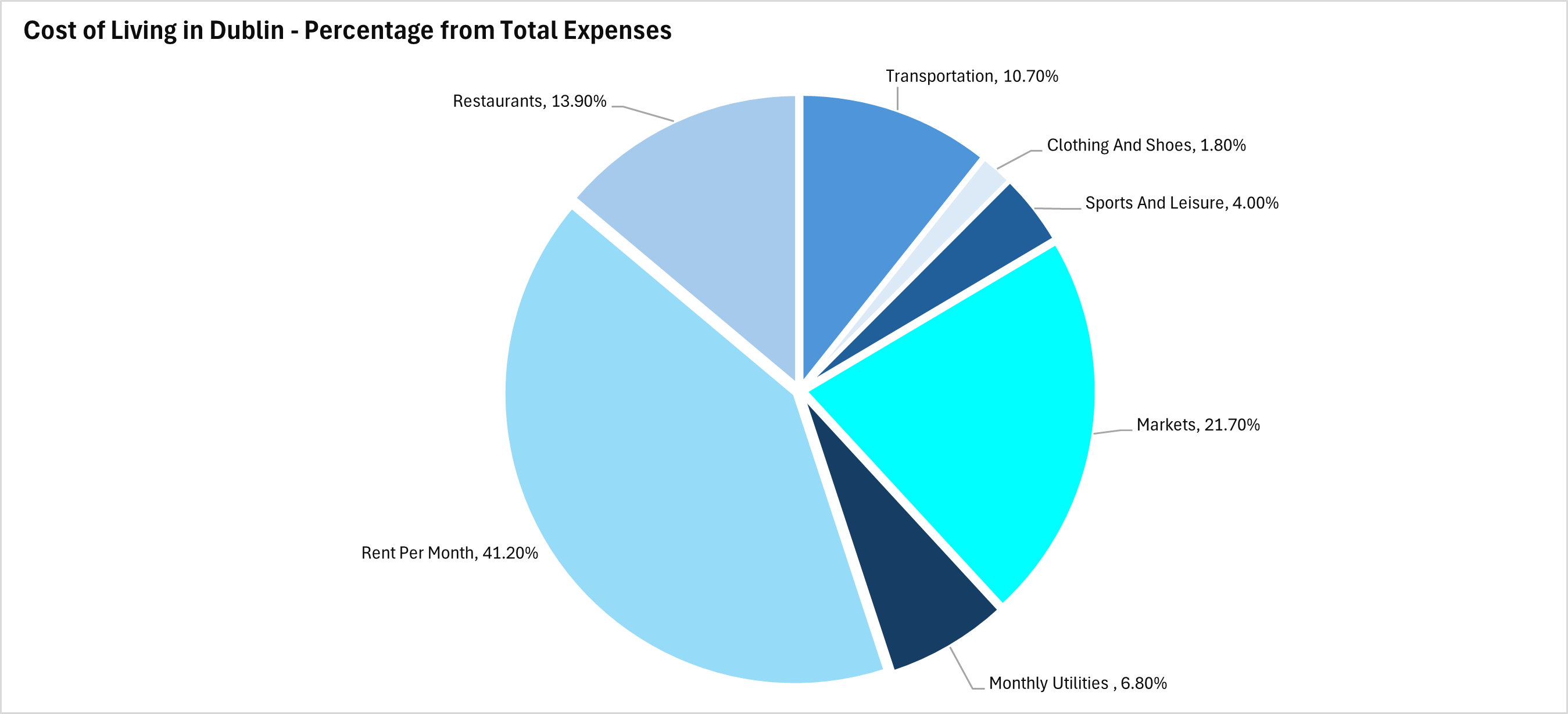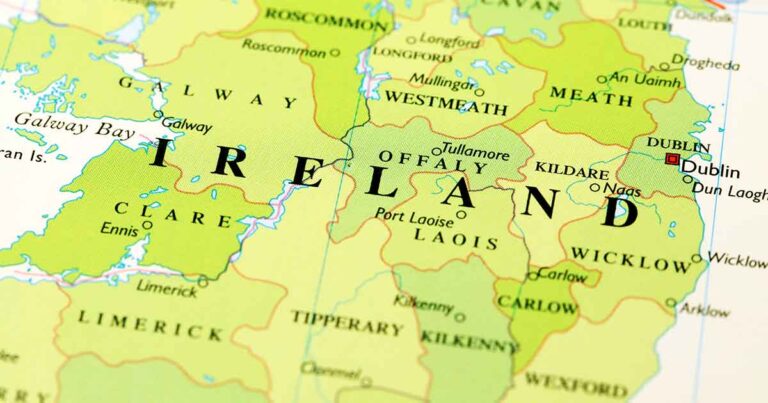Cost of living in Dublin -single, family & student

This article covers:
- Quick Overview
- Do you know?
- A glance at the average cost of living in Dublin
- Average cost of living in Dublin: Single vs student vs family
- Cost of living in Dublin – citywise comparison with other Ireland cities
- Tax scenario
- What is a good salary in Dublin?
- What should be your monthly budget to live in Dublin?
- Do’s and Don’ts
- Can’t afford Dublin? Here are the top 3 cost-effective Irish cities
- Before you go…
- FAQs
The monthly cost of living in Dublin, including rent, is €2,497 for a single person, €1,560 for a student, and €5,550 for a family of four.
With some of the best colleges in the country and a dynamic job market, Dublin stands out as a popular choice for students and professionals alike.
Are you planning to move to Dublin to pursue academics or career opportunities? You will need to know the average cost of living in Dublin to manage your finances effectively. This blog will provide you with all the required details so that you can plan your budget to live in Dublin efficiently.
Quick Overview
- The cost of living in Dublin for a single person = €2,497 per month with rent and €833 per month without rent.
- The average cost of living in Dublin for a student = €1,560 per month.
- The cost of living in Dublin for a family of four = €5,550 per month with rent and €2,654 per month without rent.
Do you know?
- Dublin ranks 51st as per Mercer Cost of Living report 2023. It is less expensive than many European countries like London, Paris, Amsterdam, Copenhagen, etc.[1]
- Dublin ranks 20th out of the 100 World’s Best Cities as per the World’s Best Cities Report 2024 beating cities like Toronto, Milan, Abu Dhabi and Boston.[2]
- In 2023, Ireland was one of the countries with the lowest unemployment rates in Europe, at only 4.45% of the total labour force unemployed.[3]
A glance at the average cost of living in Dublin

Expense Category | Percentage from Total Expenses |
Transportation | 10.7% |
Clothing And Shoes | 1.8% |
Sports And Leisure | 4% |
Markets | 21.7% |
Monthly Utilities | 6.8% |
Rent Per Month | 41.2% |
Restaurants | 13.9% |
Source: Numbeo
Average cost of living in Dublin: Single vs student vs family
Type of expense | Avg. cost per month for student | Avg. cost per month for singles | Avg. cost per month for family |
Rent and Utilities (electricity, water, heating, etc. ) | €1200 | €1664 | €2896 |
Food/groceries | €500 | €539 | €1400 |
Transportation | €50 | €155 | €404 |
Source: Livingcost.org, University College Dublin.
An overview of monthly rents in Dublin
Expense Category | Item | Avg. cost per month |
Housing | 1-bedroom apartment (in the city centre) | € 2,012.29 |
1-bedroom apartment (outside the city centre) | € 1,750.00 | |
3-bedroom apartment (in the city centre) | € 3,431.61 | |
3-bedroom apartment (outside the city centre) | € 2,841.79 |
Source: Numbeo
Cost of living in Dublin – citywise comparison with other Ireland cities
Type of expense | Dublin | Cork | Galway | Limerick |
Avg. Monthly Salary (after taxes) | €3275 | €3134 | €2790 | €2296 |
Cost of living (single) | €2497 | €2127 | €2066 | €1799 |
Cost of living (family) | €5550 | €4854 | €4406 | €3777 |
Rent & utilities (single) | €1664 | €1380 | €1411 | €1186 |
Rent & utilities (family) | €2896 | €2482 | €2345 | €1890 |
Food (single) | €539 | €519 | €478 | €445 |
Food (family) | €1400 | €1343 | €1232 | €1146 |
Transport (single) | €155 | €97.9 | €55.8 | €56.2 |
Transport (family) | €404 | €259 | €149 | €152 |
The overall quality of life | 94 | 86 | 86 | 86 |
Source: Livingcost.org (Refer to citiwise cost of living pages)
Tax scenario
Moving to Dublin involves understanding the taxes applicable to international students or working professionals. Your tax obligations in Ireland depend on your residence status and domicile. Residence status is determined by the days you spend in Ireland each tax year, from January 1st to December 31st. Domicile refers to your permanent home country.
As a tax resident in Ireland but not domiciled there, you must pay Irish income tax on income earned in Ireland and foreign income brought into Ireland (known as remitting income). Here is a quick overview for a better understanding:
Tax Payer Type | 2024 | |
@20% | @40% | |
Single person | €42,000 | Balance |
Lone parent | €46,000 | Balance |
Married couple/civil partners, one income | €51,000 | Balance |
Married couple/civil partners, two incomes | €51,000 {with a maximum increase of 33,000} | Balance |
Upon moving to Ireland, you can apply for split-year treatment for the year of your arrival, enabling you to be considered a resident from your arrival date. If your country, like Mexico or Germany, has a double taxation agreement with Ireland, it ensures you won’t be taxed twice on the same income.
Income from countries without such an agreement is taxed in Ireland after deducting any applicable foreign taxes.
Sources: Citizens Information, Revenue (Irish Tax and Customs)
What is a good salary in Dublin?
The Dublin cost of living index is comparatively higher than other Irish cities. This is due to Dublin’s standard of living. Home to some of the best universities in the county, Dublin has the best amenities and infrastructure.
This means the annual average salary in Dublin for a single working professional needs to be around €30,000 to ensure a comfortable living. This naturally reflects in the cost of living for the population, with the cost of living in Dublin for a couple being around €2,775 with rent and €1327 without rent.
Therefore, a good salary in Dublin can vary widely based on an individual’s lifestyle choices, preferred location, and other personal factors.
Also read: Average Salary in Ireland in 2024 – An Ultimate Guide
What should be your monthly budget to live in Dublin?
Category | Student | Single | Family |
Housing/Rent | €1240-€1880 | €1600-€2600 | €2000-€3000 |
Utilities | €100-€150 | €460-€510 | €820-€900 |
Groceries | €500-€700 | €860-€1060 | €1220-€1420 |
Transportation | €80-€100 | €440-€500 | €800-€900 |
Other (entertainment, shopping, personal care) | €100-€200 | €500-€600 | €900-€1000 |
Total##(approximately) | €2020-€3030 | €3860-€6270 | €6740-€8220 |
##It is an approximate value based on consumer prices and the average living expenses of an individual. It is advisable to consider income level, spending habits, location, and specific monthly expenses to calculate an accurate budget.
Do’s and Don’ts
Do’s
- Track your expenses carefully. Use budgeting apps to monitor your income and expenses.
- Allocate funds for specific necessities like rent, utilities, groceries and transportation. Ensure you save a portion for emergencies as well.
- To save on steep rent prices in Dublin, you can opt for shared housing or look for accommodations outside the city centre for more affordable options.
- If you are a student, you can opt for student halls or apartments for convenience and cost savings.
- You can also consider biking as a healthy and economical transportation option.
- Plan your meals and create shopping lists to avoid impulse buys.
- Most supermarkets have weekly special sales or coupons you can use to lower your overall expenses on groceries. Students also get discounts on designated items or in stores. As a student, consider taking up a part-time job in Ireland, specifically Dublin, to cover your daily expenses.
- You can also shop at weekly farmer’s markets for fresher produce at lower prices.
- Another great way to save money is to cook at home. This not only helps you avoid the hefty expenses of eating at restaurants but also helps you eat healthier.
- The most important part about saving money is opening a local bank account. This helps you easily manage your finances.
- If you are a student, apply for discount cards like the student Leap card, ISIC card or student travel cards for travel and shopping discounts.
Don’ts
- Avoid unplanned purchases and stick to your shopping lists to save money.
- Limit dining out and opt for home-cooked meals.
- Look for early-bird discounts or student discounts if you are a student when shopping or eating out.
- If you are a student, always carry your student ID and ask for discounts at stores, restaurants and events.
- Be careful about energy and water usage to keep your utility bills low. Switch off lights when not needed, unplug all electronics when not in use and reduce heating when not required.
- Avoid booking travel tickets at the last minute to avoid paying higher prices.
Can’t afford Dublin? Here are the top 3 cost-effective Irish cities
1. Cork
Cork is a city known for its high quality of life. It is an excellent option for foreign students, as the vibrant community and beautiful surroundings are a great introduction to Ireland. The University College in Cork is one of the top universities in Ireland.
In addition to excellent educational institutions, Cork offers abundant opportunities in technology, healthcare, finance, and tourism, making it an attractive destination for working professionals relocating to Ireland.
A great advantage of living in Cork is that it is more economical than Dublin but also provides amenities and connectivity similar to Dublin.
Average cost of living per person: €2127
2. Galway
Galway is the ideal city for fully immersing yourself in Irish culture during your studies or work experience. It’s home to prestigious educational institutions like the University of Galway and provides diverse job opportunities in various industries. Known for its vibrant cultural scene, Galway hosts renowned festivals such as the Galway International Arts Festival and the Galway Oyster Festival. It’s perfect for students eager to explore Ireland’s rich culture.
Additionally, Galway boasts a lower cost of living, urban conveniences, and tranquil natural surroundings.
Average cost of living per person: €2066
3. Limerick
Limerick is another fantastic city that offers some amenities and living experiences in Ireland. With exceptional educational institutions like the University of Limerick and Limerick Institute of Technology, the city is great for foreign students wanting to pursue higher education.
Furthermore, Limerick offers ample employment opportunities in industries like life sciences, healthcare, manufacturing, research and development and digital technology.
It is a great option that offers affordability, excellent education and great career opportunities.
Average cost of living per person: €1799
Before you go…
Dublin is a great city with incredible growth opportunities for international students and working professionals. However, moving to a new country entirely requires research and in-depth knowledge of factors like taxes and the expected cost of living to make more informed decisions for budgeting.
Another important aspect that needs attention is choosing economical and reliable services whenever you need to send money from Ireland back to your home country. A great fast and reliable option is Instarem.
Instarem offers competitive rates for converting EUR to INR or any other currency. This ensures that every transaction you make to send money to India from Ireland is converted at affordable# prices, which helps save money in the long run.
Moreover, you can now download the Instarem App from the App Store and Google Play for hassle-free money transfers at your convenience while also earning InstaPoints on future transfers.
For working professionals or international students, money transfer through Instarem is a preferred option as it helps them save more on transaction costs and is easy to use.
FAQs
Q. Is it expensive to live in Dublin?
Yes, it is the most expensive city to live in Ireland, with Dublin’s living expenses for a single person costing around €2497.
Q. How much money do you need to live in Dublin?
A single person would require a budget of €3860-€6270 monthly to live comfortably in Dublin.
Q. How much is the cost of living in Dublin for International students?
It costs around €1560 per month for an international student to live in Dublin.
Q. Is it cheaper to live in Sydney or Dublin?
The cost of living in Dublin is only 1% lower than Sydney’s. While technically Sydney is more expensive, the difference between the two cities is minimal.
Q. What is the average room rent in Dublin?
The average rent for a 1-bedroom apartment in the city centre is around € 2,012.29 and for one outside the city centre is around € 1,750.00.
Q. What is the cost of living in Dublin per month?
The monthly average cost of living in Dublin for a single person is around €2497.
Q. How much is the cost of living in Dublin for a couple?
The monthly average cost of living in Dublin for couples is around €2,775 with rent and €1327 without rent.
Q. What is the cost of living in Dublin for a single person?
The monthly average cost of living in Dublin for a single person is around €2497.
Q. What is the cost of living in Dublin for a family?
The monthly average cost of living in Dublin for a family of four is €5550 with rent and €2654 without rent.
Q. What is a good salary in Dublin?
A good salary in Dublin depends on the individual’s lifestyle. Typically, a salary between €3860 and €6270 is sufficient for a single person to live comfortably.
Other Related Articles
Disclaimer:
- This article is intended for informational purposes only. All details are accurate at the time of publishing. Instarem has no affiliation or relationship with products or vendors mentioned.
- Prices mentioned in this blog are subject to change.
- ** Fast meaning 75% of our transactions are completed in 15 minutes. Depending on the funding method.
- # When it comes to affordable exchange rates and fees, it’s worth noting that the cost will vary depending on how you choose to fund your transactions. Credit card funding and bank transfer fees can differ significantly.
- The prices were taken on 27th and 28th June 2024 from different sources and are subject to change.
Citations:























